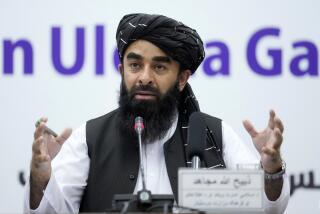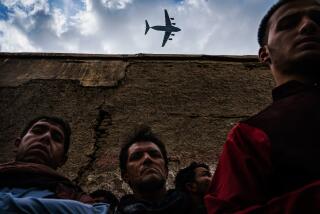The Afghan crucible
‘LAST YEAR, THE NUMBER of roadside bomb attacks almost doubled, direct fire attacks on international forces almost tripled and suicide bombings grew nearly fivefold.” That’s not a quote from one of the president’s critics about Iraq -- it’s from the president himself, and he was talking about Afghanistan.
It’s not quite fair to call Afghanistan the war the administration forgot. But it was heartening last week to hear President Bush give a speech about that other war for the first time in his second term, to acknowledge the growing Taliban threat and to call for a renewed U.S. and NATO commitment. Still, military power alone won’t make Afghanistan secure -- the country must also undergo substantial economic development.
Congress should approve Bush’s request for $11.8 billion for the next two years of operations in Afghanistan, but this will not suffice. Without a plan to jump-start reconstruction -- and convince the Afghan people that the civil society the West wants to build for them is not just obtainable but worth fighting for -- all could be lost.
The old saw that there are no military solutions to political conflicts was never more true than in Afghanistan. Yet, in the five years since U.S. forces toppled the Taliban government with a “light footprint,” the Bush administration has never spent enough on reconstruction, opium-crop substitution payments for farmers, road building, education, healthcare or jobs programs -- or enough on security to make sure the rebuilding succeeds.
Bush will not get the full support and cooperation of NATO allies until he demonstrates that reconstruction is not a second priority to fighting Al Qaeda. There are serious differences with Germany, which has sent thousands of troops and spent millions in Afghanistan, commanded NATO forces and been responsible for security in the country’s north, where Berlin believes its style of nation-building has been notably successful. The government of Angela Merkel has signaled it believes that Washington is relying too heavily on military solutions.
The war effort cannot be allowed to falter over an “Americans are from Mars, Europeans are from Venus” cultural divide on whether to emphasize military commitment or nation-building. Both approaches are necessary.
NATO needs to bear its share of the burden, contributing troops to the fight in the south and continuing to lift conditions on their deployment. And Washington, however distracted by its Iraqi adventure, cannot shortchange the effort to rebuild the nation whose failure led directly to 9/11. The possibility that democracy could fail in Afghanistan is awful to contemplate.
More to Read
Sign up for Essential California
The most important California stories and recommendations in your inbox every morning.
You may occasionally receive promotional content from the Los Angeles Times.










